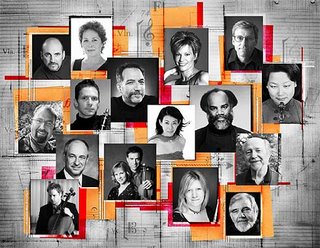Moravec and More at the Contemporary Music Forum
 The first Contemporary Music Forum concert of the season got under way last Sunday at the Corcoran Gallery. James Mobberly, Kaija Saariaho, Paul Lansky, and Paul Moravec were featured by Audrey Andrist (piano), Lina Bahn (violin), Tobias Werner (cello), Barry Dove (marimba), and David Jones (bass-/clarinet). Although the concert was not billed as such, it might well have been titled “Introduction to Contemporary Classical Music”… with all works easy on the novice ears, easy on our mood, and suitable even for children.
The first Contemporary Music Forum concert of the season got under way last Sunday at the Corcoran Gallery. James Mobberly, Kaija Saariaho, Paul Lansky, and Paul Moravec were featured by Audrey Andrist (piano), Lina Bahn (violin), Tobias Werner (cello), Barry Dove (marimba), and David Jones (bass-/clarinet). Although the concert was not billed as such, it might well have been titled “Introduction to Contemporary Classical Music”… with all works easy on the novice ears, easy on our mood, and suitable even for children.Most accessible and fun of them was the aptly named Hop, Paul Lansky’s 1993 contribution to the underdeveloped field of silly, toyful [sic!] music scored for marimba and violin. A wonderful example that decidedly modern contemporary classical music can still perform the essential (if not sole) function of all music: entertain. It did that with humor, coy sounds, and clap-along rhythms – but never by pandering. Lisa Bahn and Barry Dove (whose blues playing in the respective section might have been a little ‘too behaved’) were responsible for the warmhearted, immaculate performance.
Opening the concert was Mobberly’s Caution to the Winds, a duet for piano and tape. Recorded and sampled piano sounds (spat back out from what is now, in 2006, a CD player) engaged with Ms. Andrist’s piano playing. It reminds a little of György Kurtág’s Játékok (Games), and the computer sounds betray their 1987 vintage. But whereas the limitations of electronic sound production on a computer in the '80s (perhaps impressive at the time) were soon thereafter an acoustic embarrassment to our ears, they have by now acquired a patina of nostalgia and a humorous twang. In its race against and collaboration with the piano, it becomes a droll affair of (wo-)man vs. machine; a machine that sounds like a cross between R2-D2 and a saloon upright. That the whole thing is rich with musical ideas made it a happier affair, still.
Kaija Saariaho’s Petals, as of late available on CD (see ionarts review) appeared between the two works as apt contrast. Modern music like Petals (with general, rather than precise instructions to ‘create sounds’, not play certain notes at certain values) often leaves more room for interpretation and alteration as part of the performance than standard repertoire. The live experience is therefore alive… always changing and somewhat unpredictable. This not only adds to the occasion of hearing the music (whether for the first or fifth time), it predestines this kind of music for live performance. Recordings can help us understand such works better – but there is a touch of the silly involved, just like it is both cute and stupid to make a recording of aleatory music.
Charles T. Downey, Contemporary Music Forum (DCist, September 19) |
Paul Moravec’s Tempest Fantasy (for piano trio and bass-/clarinet) was introduced by the composer himself. It would be failure on the part of the composer not to make a work of that title sound tempestuous and failure on part of the critic to find no other description for it. Alas, Mr. Moravec himself described the opening of the fifth and last movement (Fantasia) so and quoting him is my excuse for not coming up with descriptive prose more purple.
Fantasia, which might well have been titled “Prospero Prevailing,” sums up the Puliter Prize-winning Tempest Fantasy’s first four movements: a spiky-joyous and flighty characterization of Ariel; the melancholic cello that is a lamenting Prospero; the limping dance of Caliban in the third movement (Peter and the Wolf just around the corner). And Sweet Airs, exposed on ‘Ariel’s’ violin and inspired by Caliban’s speech “The Isle is Full of Noises” (III.ii.130–138). G-D-A-E (the violin’s open strings) dominate Ariel, the Prospero cello-theme is prominantly summoned in the Fantasia - but now imbued with the jazzy beat the first movement hinted at. Caliban, a “misshapen monster” (Moravec) is portrayed by David Jones’s bass clarinet. Apt, too – since the description “misshapen monster” equally applies to that absurd-looking instrument... a Three-Mile-Island love-child between a clarinet and a saxophone.
Enough critics have commented on just how splendid (if backwards looking) a work the Tempest Fantasy is (it really is an attractive combination of cogent, sometimes challenging, melodic, lyrical, wild music with fun and high spirits packed into it). I don’t think that either the third or fourth movement would be hurt if they were a tad briefer, but whenever played as impressively as on Sunday (it may be easy on the ears but seems cruelly difficult to play), it is all too easy to see why Terry Teachout has for so long been an ardent champion of Paul Moravec’s music.

Sounds and sweet airs, that give delight and hurt not. Sometimes a thousand twangling instruments Will hum about mine ears, and sometime voices That, if I then had waked after long sleep, Will make me sleep again: and then, in dreaming, The clouds methought would open and show riches Ready to drop upon me that, when I waked, I cried to dream again. |





















































